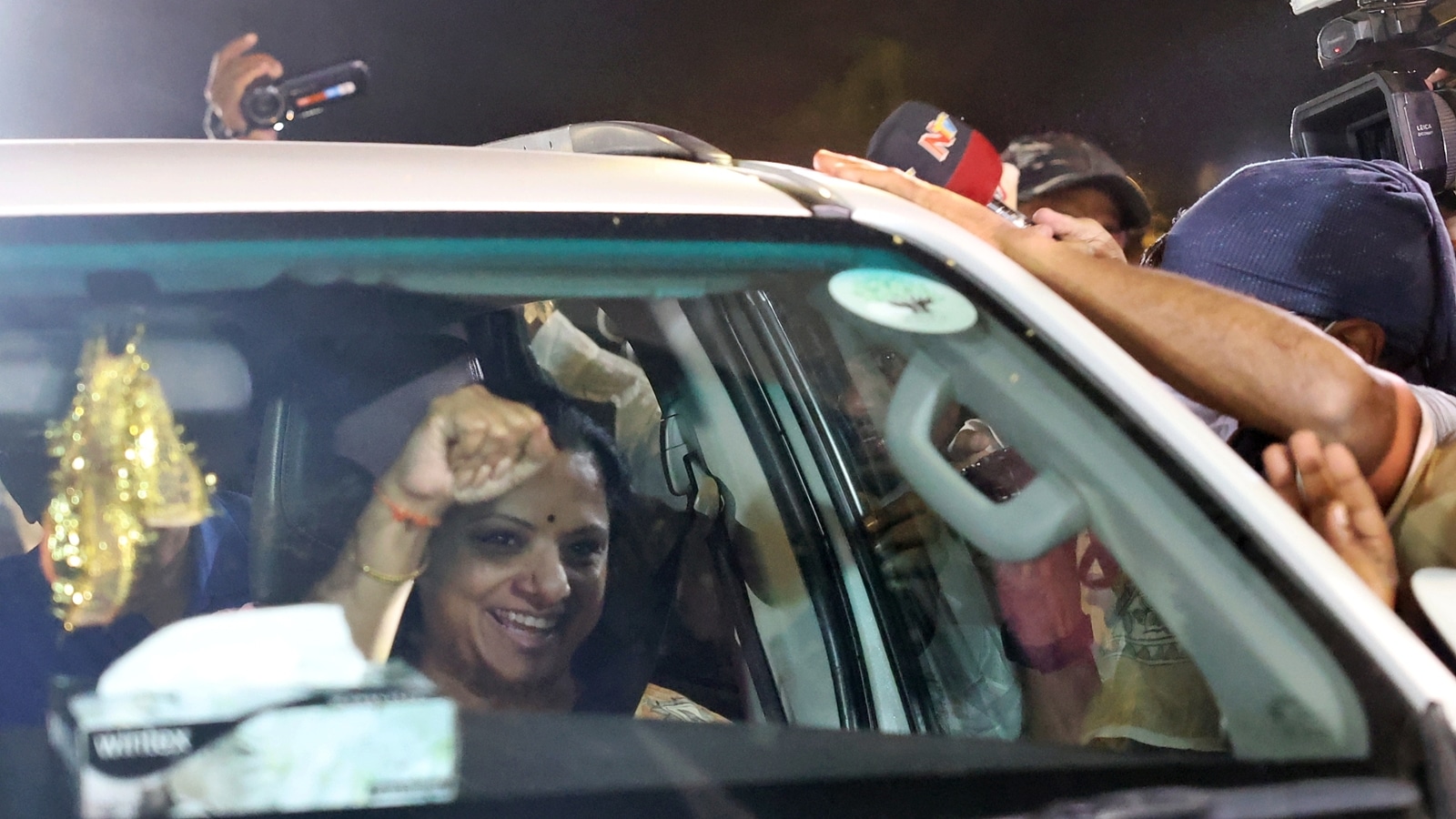Supreme Court grants bail to BRS leader K Kavitha in Delhi excise policy case, says ‘undertrial custody shouldn’t turn into punishment’
Supreme Court was critical of High Court single judge order against Kavitha, the daughter of former Telangana CM K Chandrasekhar Rao; referred to its judgment granting bail to ex-Delhi Deputy CM Manish Sisodia.
 BRS leader K Kavitha comes out of the ED office in New Delhi on March 11, three days before her eventual arrest. (xpress photo by Praveen Khanna)
BRS leader K Kavitha comes out of the ED office in New Delhi on March 11, three days before her eventual arrest. (xpress photo by Praveen Khanna)The Supreme Court on Tuesday granted bail to Bharat Rashtra Samithi (BRS) leader Kalvakuntla Kavitha in the graft and money laundering cases registered by the Central Bureau of Investigation (CBI) and Enforcement Directorate (ED) respectively in connection with the alleged Delhi excise policy scam.
A bench of Justices B R Gavai and K V Viswanathan said that the investigation is complete and as such Kavitha’s custody is not necessary for the purpose of the probe.
K Kavitha, daughter of former Telangana chief minister K Chandrasekhar Rao, has been in custody since March 15.
It added that “the appellant is behind bars for the last 5 months….taking into consideration that there are 493 witnesses to be examined and 50,000 documents to be considered, the likelihood of the trial being concluded in the near future is impossible”.
The bench referred to its judgment granting bail to former Delhi Deputy Chief Minister Manish Sisodia in the excise policy case and said “as observed” by it in the matter, “undertrial custody should not turn into a punishment”.
The court also relied on Section 45(1) which entitles women for special treatment for grant of bail under Prevention of Money Laundering Act (PMLA) and said “it permits certain categories of accused including women to be released on bail without the stringent requirement under section 45 to be satisfied”.
The court added, “no doubt that as argued by the Additional Solicitor General (ASG), in a given case, the accused even if a woman may not be entitled to the benefit of the said proviso. It will all depend on the facts and circumstances of each case”.
It said “however, when a statute specifically provides for special treatment of a category of accused, when denying that benefit the court will have to come to a specific reason as to why such a benefit is to be denied”.
The bench was critical of the High Court single judge order which refused to extend the benefit of Section 45(1) to Kavitha.
It said “the order of the single judge which denies special treatment to the present appellant makes an interesting reading…” It comes to a heartening conclusion that the appellant is a highly qualified and well accomplished person having made significant contributions to politics and social work. The court observed that while deciding on the bail application, it cannot lose sight of the severe allegations levelled by the prosecution and evidence collected during the course of the investigation.
“The learned single judge goes on to observe that the present applicant cannot be equated to vulnerable women. The single judge observed that the proviso to section 45 is applicable only to vulnerable women,” the apex court mentioned.
The SC said, the “single judge totally misapplies the ratio laid down by” it and added, that in fact, what has been laid down is that “courts need to be more sensitive and sympathetic towards the category of persons included in the first proviso to section 45 and similar provisions in the other Acts”.
The court observed that persons of tender age and women who are likely to be more vulnerable may sometimes be misused by unscrupulous elements and made scapegoats for committing such crimes. “No doubt that the court observed that nowadays educated and well placed women in society engage themselves in commercial ventures and enterprises and advertently or inadvertently engage themselves in illegal activities.
The court, therefore, cautioned courts to apply judicial discretion while deciding such matters. the court does not say that merely because a woman is highly educated or sophisticated or an MP or MLA, should be denied the benefit of Section 45 proviso”.
Setting aside the HC order, it added, that the HC had “totally misdirected herself while denying the benefit of proviso of Prevention of Money Laundering Act”.
The SC also clarified that it had not observed anything on the merits of the matter and that nothing said in the order will prejudice the trial.ne






